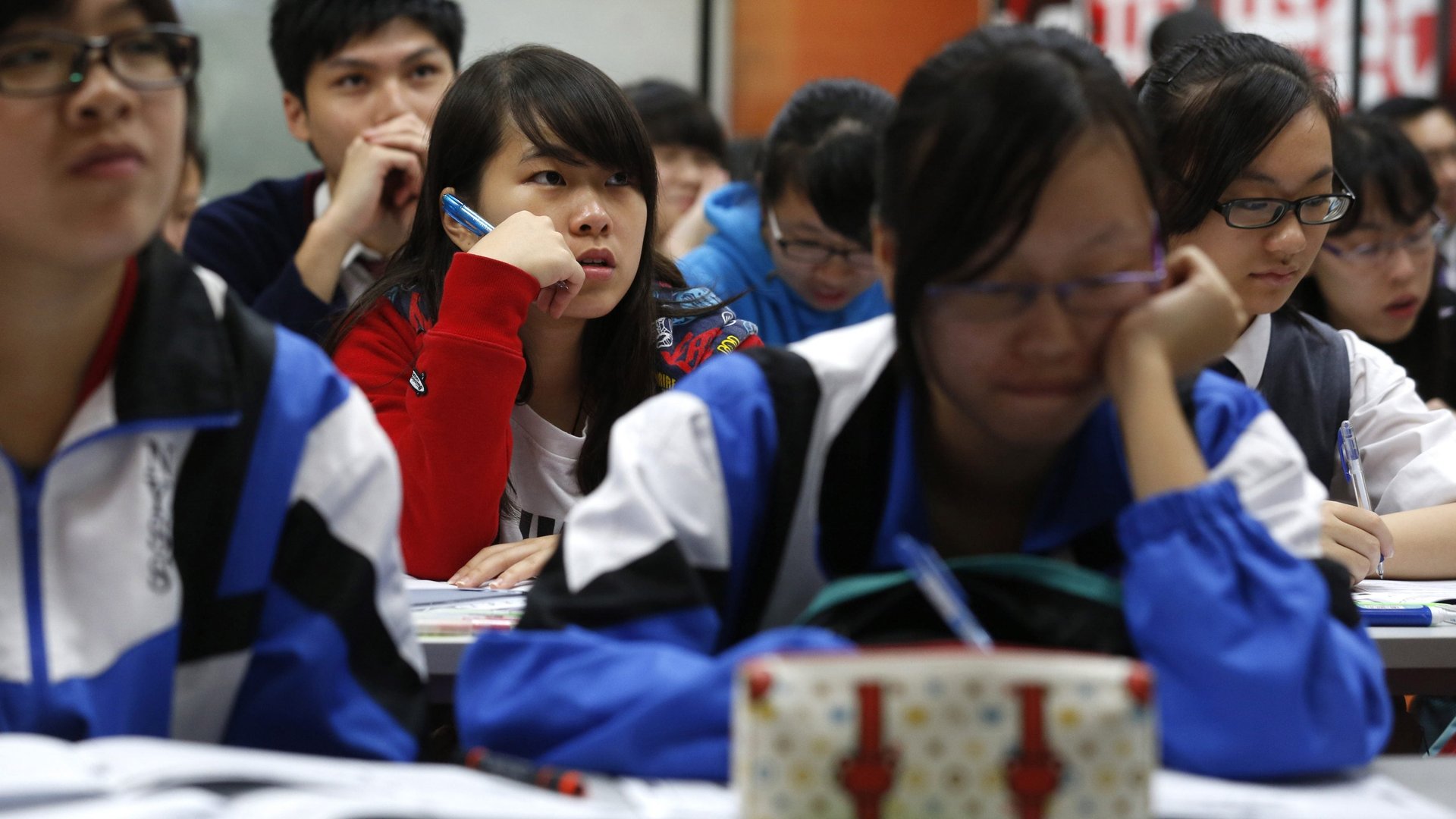A spate of student suicides is forcing Hong Kong to confront its cutthroat school system
“Going to school was like going to prison.”


“Going to school was like going to prison.”
Chan Yu-ling, a fourth grade primary school student in Hong Kong, gave a powerful testimony (video) last month when the city’s legislature convened a special session to address the rising number of student suicides, which has called attention to the cutthroat local school system. “In the classroom, I was not allowed to move, drink water, eat, go to the toilet, or talk,” said Chan, whose parents eventually removed her from the local school system and placed her in an international school. “The teachers spent little time teaching. We spent most of our time doing mock exams.”
Since the 2015 school year began, Hong Kong students have been taking their lives with alarming frequency. Thirty-five students committed suicide in 2016. This month alone, three students leaped to their deaths in a little over a week’s time, two of the cases within 24 hours of each other. Update: On Feb. 22, another 14-year-old boy leapt to his death after his parents accused him of spending too much time on video games (link in Chinese). Together, five students have committed suicide this month.
The toll of academic stress on students’ mental health is a common story throughout Asia, where families place high value on grades, education systems are often centered around exams, and in some countries test scores alone can determine whether students are admitted to university. In South Korea, the leading cause of death for those between 15 and 24 is suicide. Last year, Singapore’s teenage suicide rate reached a 15-year high. In India, a village known as the country’s test prep capital has seen dozens of suicides in recent years.
In Hong Kong, the spate of suicides has led the government to establish a Committee on Prevention of Student Suicides last year. After reviewing 71 suicidal cases (pdf, p.15) over the past three years, the committee in November called for a review of the education system (p.102). A local concern group of psychologists last year urged students to sign a “no-suicide contract” proposed by the government, which asked students to “promise not to harm myself or commit suicide.”
Cheung Siu-chung, a secondary school history teacher and member of the Hong Kong Professional Teaching Union, said that the rash of suicides “is the accumulative effect of the education system.”
“Under this education system, students are evaluated like stocks, and teachers are like fund managers who need to boost the stocks,” he says. “How can you expect students to not feel pressure?”
Hong Kong’s emphasis on testing starts from an early age for students in the local school system. The government-led Territory-wide System Assessment (TSA), a system closely connected to local school performance evaluations, is embedded through the primary and secondary school system. Starting in the third grade of primary school, students take the first TSA, which tests them on subjects of math, English, and Chinese. In post-secondary school, students take the Diploma of Secondary Education Examination to compete for a limited number of spots at eight Hong Kong universities.
The heavily score-driven culture has raised wrath among parents. In 2015, nearly 40,000 (link in Chinese) parents signed a petition urging the government to cancel the TSA for third graders.
The local education authority opted instead to replace the TSA with new testing requirements called Basic Competency Assessments (BCA), which Eddie Ng, secretary for the education bureau (link in Chinese), said has helped ease the excessive drilling. But some don’t see much difference between the BCA and TSA. “The authority just changed the name,” says Hilda Cheung, the mother of a third grade student and organizer of a local parent focus group. “I’m very dissatisfied with Hong Kong’s education system… the test-driven culture in Hong Kong schools has very deep roots.”
Chan’s mother said she often had to stay up late into the night helping her daughter do her test prep, so that the fourth-grader could have an hour to play everyday.
Local lawmaker Alvin Yeung also questions the education system. ”I just want to ask Ng if you can sleep well at night,” he wrote (link in Chinese) in a Feb. 8 Facebook post. In it, he shared an email from a secondary school pupil who talked about how Hong Kong students were “force fed” education.
“Everyone, including the government, parents, teachers, and even all of society, has put great value on scores in the education system,” the student wrote. “I wouldn’t deny that scores are important, but they don’t represent everything about a person.”